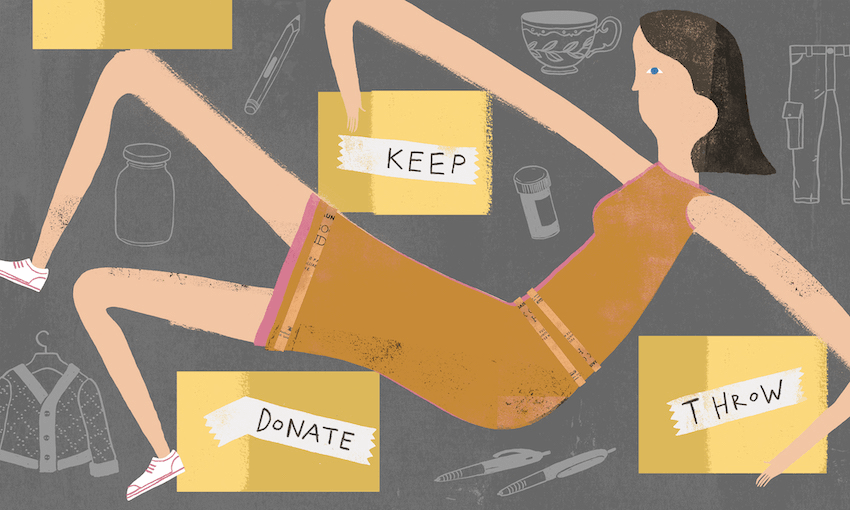Bathroom, kitchen, sitting room, bookshelves, friends, memories – Linda Burgess ponders the decluttering of life.
Made possible thanks to the support of Creative New Zealand
Original illustrations by Gary Venn
Go to the second drawer down in your bathroom. Open it. In it are countless small bottles of shampoo and skin cream that you brought home from that hotel. Most tragically, they are evidence that you found staying in a hotel unbearably exciting. Along with that, they show that you’re bordering on the edge of being a petty thief. You are someone who assumes that if you’re not meant to take them, well damn them, you’ve paid, they’re yours, aren’t they? They also show that you’ve been taken in by hype: just because the bottle has a double-barrelled ostensibly posh English name on it and the word lavender subtly highlighted, doesn’t mean that the chemical-rich creamy stuff in that bottle won’t give you eczema in your ears. And what were you actually going to do with that skimpy plastic shower hat that makes you look like you work on the production line of a factory in China? Goodbye, impossible-to-unscrew mini tube of toothpaste.
Move now to the kitchen and open what can only be called the kitchen drawer. Test every one of those biros and throw away every single one that doesn’t work. Also dispose of the really crummy ones, the wobbly ones, the ones that have pale green ink, the ones with the brand name of the shop you don’t recall ever having been to, the ones with a minuscule amount of ink in them, the ones with the broken bit that if you’d been an office worker 45 years ago, you’d have had nonchalantly displayed clipped on the outside of your polyester cotton shirt’s breast pocket. And when did you last use a pencil? Chuck it. After dealing with those, take out those neatly rolled short pieces of string, place the ostensibly useful purple rubber bands that were round the broccolini, the wooden sushi chopsticks and the rip-here sachets of soy sauce, the little sachets of sugar, the receipts that you can no longer read, in the bin. If you don’t know what lock that key is for, why do you still have it? Be aware though that the week after you get rid of it, you’ll suddenly remember why it was there for safe keeping.
The coin jar that sits on the shelf in the sitting room. Oh dear. Who’s going to treasure the Egyptian coin from 1942 that your father possibly brought back with him from the war? Let’s hope there’s a freakish grandchild who also wants your – actually rather lovely – stamp album. There’s loads of NZ 1, 2, 5, 10, 20, 25 and 50 cent pieces. How quaint! Then there’s the French 10 franc coins – an aside: why on earth did they go for the euro when they had such pretty banknotes? – but getting back to the coins in your bowl, there’s the 10 franc coin, now worth nothing more than a fleeting memory that only you have – no one else, just you – of once living in France, and how 10 francs was round about NZ$2 and $2 bought you blah blah blah. A house in the country? Ten croissants? Then English pounds. Oh, a pound! Once a gift from your richest aunts! Australian dollars. They don’t work in parking meters. Whatever.
Speaking of aunts. Go to your bookshelves. Your husband’s aunt, wondering what the hell to buy him for a birthday, will have got him a book about a cricketer called Glen. All cricketers are called Glen. If you take all of these books – and there will be a lot of them – to a secondhand bookshop they will look pained. They will pull away. You may have to bribe them to take them. Pretend to faint if you have to, and while they’re away getting you a glass of water, dump them and run. They might be slightly keener on Edmund Hillary. Or not. The good news is your husband, who’s argued energetically on their behalf, will actually not notice that they’ve gone. And also he will not notice that you have everything that Margarets Drabble, Forster and Atwood, the Barbaras, the Alices, the Elizabeths, the Penelopes, the Fionas have ever written and that nothing, nothing would induce you.
Hmm, small silver frames. They’re in the drawer in the spare bedroom. Possibly pewter. Once they were the best birthday present for a friend, the best sort of token gesture. You bought them yourself from that little shop your friend opened. You have dozens of them; tiny tiny wedding photo of your in-laws, that really cute one of your husband and his brothers in their smocked shirts, you with your golliwog, one of your darling baby. So small that no one even looks at them. Always black and white, or possibly, that odd browny yellowy colour that photos in the 70s turned. No one has them displayed on the piano any more. Do whatever you’re going to do with them. Feel no shame.
Into the bedroom. Your wardrobe, oh no, your wardrobe. Beware. You’ve read that article about putting your clothes on hangers at the back of your wardrobe and if they’re still there unworn in say three to six months’ time, get rid of them. But hang on – there’s that cardigan, the beige one that makes you look like your cousin, the one who looked like a nun, the one who actually wanted to be a nun, the cardigan that the dog gnaws in a slightly salacious way if he gets half a chance, and there it sits until you think “bugger it”, and take it to the hospice shop. Two weeks later, you go out somewhere at night and it would have been perfect. Cosy, practical, unassuming. Warm! What were you thinking of?
What you need to come to terms with at a certain age is only buying and keeping a certain type of clothes. Now, I go into a shop and say, “I already have something exactly like that”. So yes please, I’ll buy it. If they look like your other clothes, keep them. If they’re colourful, quirky, fun, have got hemlines that look like a fault line, ask yourself why the hell you ever bought them in the first place. You know you don’t do turquoise, bold flowers, you know you’re not a good sport, you know you don’t work for the Ministry of Something Serious, so shove them in the last plastic bag you got from the supermarket. (Hey! That’s collectable!) But goodbye quirky garment. I won’t miss you for a second.
Your husband’s wardrobe. Deep breath. Trousers with pockets on the sides, for when he’s out being David Attenborough. Elderly corduroys that swarm around his knees. Shirts that look like ones either of the Bushes might wear. Give thanks for the t-shirts from Ata Rangi and MOMA, the yellow trousers. And close the door. You are not anyone else’s keeper.
You’re nearly there, but let’s look at what you’ve been caught up in lately. Oh please don’t say you have words on your kitchen wall. On any wall. I ask you to remember you’re not Ralph Hotere. You’re not Bill Manhire. So then, is your house on the market? Are those cushions smothering your bed? Is that why you’ve got the soppiest sentimental words to do with food and family displayed? If not, I need to quote my son, who said, after having older family members to stay, that the only words he wanted on his kitchen wall were these: Don’t Hover. Give the cushions to the hospice shop. The words back to someone who doesn’t value them.
Sit down and make yourself a cup of something, or pour a glass of something nice. You’re in the mood now, you’re on a roll. Turn on your computer, click on Facebook. Click on friends. Declutter, declutter, declutter. You have 1,394 friends. Now this is a conundrum. What if you decide to delete everyone you’ve never met in person? That leaves you… say, 100. Or what say you decide to delete everyone who has ever posted anything on the sentimental side? Something cute about an animal? A photo of themselves in a frame which says I Am..? Something homophobic, racist, right wing, humble-bragging, misspelt? You’d have no one left.
It comes to your attention that you’re sitting down. You’d forgotten how nice it feels, sitting down, compared with pulling out drawers and flinging open the doors of cupboards. Something is draining from you. It could well be the will to reorganise. Turn off that computer. Push those drawers back in, kick the cupboards closed. Ignore the bags of stuff that you’re passing on to become someone else’s clutter. That could well sit by the back door for quite some time. That could actually start gnawing their way into your conscience. Why did you own so much to start with? Why are we filling the world with so much rubbish?
By your bed you have that pile of books, the ones you’ve bought, borrowed from a friend, borrowed from the library. Walk over to your bed. Lying down is even better than sitting down. You have a choice: the sofa, or, what the hell, that bed. Who cares what time of day it is, daylight saving has already stuffed everything up. Choose randomly from the pile. Turn to the page that you’ve folded over, even though you know that this drives some people nuts. To you, it’s a sign: a reader has had this book. A reader has loved this book for what it says. These aren’t words to enhance your kitchen wall. These are words that matter.

